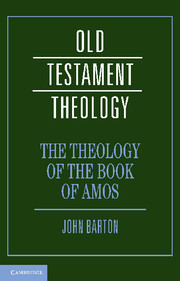Book contents
- Frontmatter
- Contents
- General Editors’ Preface
- Preface
- Abbreviations
- Chapter 1 Amos: The Critical Issues
- Chapter 2 Religious Belief and Practice in Amos’s Day
- Chapter 3 The Theology of Amos and His Circle
- Chapter 4 Theological Themes in the Additions to the Book of Amos
- Chapter 5 The Theology of the Book of Amos
- Chapter 6 The Reception of the Theology of Amos
- Chapter 7 The Theology of Amos Then and Now
- Further Reading
- Author Index
- Scripture and Apocrypha Index
- References
Chapter 6 - The Reception of the Theology of Amos
Published online by Cambridge University Press: 05 June 2012
- Frontmatter
- Contents
- General Editors’ Preface
- Preface
- Abbreviations
- Chapter 1 Amos: The Critical Issues
- Chapter 2 Religious Belief and Practice in Amos’s Day
- Chapter 3 The Theology of Amos and His Circle
- Chapter 4 Theological Themes in the Additions to the Book of Amos
- Chapter 5 The Theology of the Book of Amos
- Chapter 6 The Reception of the Theology of Amos
- Chapter 7 The Theology of Amos Then and Now
- Further Reading
- Author Index
- Scripture and Apocrypha Index
- References
Summary
So far, we have looked at what modern scholarship can tell us of the original teaching of Amos against its contemporary background, and of the meaning the book acquired through its various stages of redaction and incorporation into the collection that is the Old Testament. But how did past readers receive and understand what the book was saying?
Amos in Ancient Israel, in the Early Church, and at Qumran
In one sense, Amos was a very important theological influence on those who came after him. Even in the eighth century, there is good reason to think that Isaiah was familiar with his words, as was argued by Reinhard Fey back in 1963. A message of uncompromising doom becomes normative for biblical prophecy, as we read in the story of Jeremiah’s confrontation with Hananiah:
Then the prophet Jeremiah spoke to the prophet Hananiah in the presence of the priests and all the people who were standing in the house of the Lord; and the prophet Jeremiah said, “Amen! May the Lord do so; may the Lord fulfill the words that you have prophesied, and bring back to this place from Babylon the vessels of the house of the Lord, and all the exiles. But listen now to this word that I speak in your hearing and in the hearing of all the people. The prophets who preceded you and me from ancient times prophesied war, famine, and pestilence against many countries and great kingdoms. As for the prophet who prophesies peace, when the word of that prophet comes true, then it will be known that the Lord has truly sent the prophet.” (Jer 28:5–9)
- Type
- Chapter
- Information
- The Theology of the Book of Amos , pp. 161 - 180Publisher: Cambridge University PressPrint publication year: 2012

